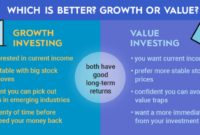Embark on an investing journey with our comprehensive guide to Best Value Stocks for Beginners. Discover the secrets to identifying undervalued companies with strong fundamentals, high growth potential, and attractive valuations, empowering you to make informed investment decisions and maximize your returns.
In this beginner-friendly guide, we’ll delve into the world of value investing, exploring key financial ratios, growth indicators, valuation methods, and risk assessment strategies. By understanding these concepts, you’ll gain the knowledge and confidence to navigate the stock market and make sound investment choices.
Best Value Stocks for Beginners

Value investing is a strategy that involves buying stocks that are trading below their intrinsic value. This can be a great way to generate long-term returns, as the stock price should eventually rise to reflect the company’s true value.
There are a number of factors to consider when evaluating a company’s value, including its financial health, growth potential, valuation, and risk profile.
For beginners venturing into the stock market, selecting the right stocks can be daunting. Value stocks offer a balance of stability and potential growth, making them a suitable starting point. However, if you’re seeking more aggressive returns, exploring Top growth stocks in the stock market could be a worthwhile consideration.
Growth stocks represent companies with high growth potential, often in emerging industries. While they carry higher risk, they also present the potential for substantial gains.
By diversifying your portfolio with both value and growth stocks, you can strike a balance between stability and the potential for long-term returns.
Company Fundamentals

The financial health of a company can be assessed by looking at its financial ratios. Some of the most important ratios to consider include the P/E ratio, debt-to-equity ratio, and return on equity.
- The P/E ratio measures the price of a stock relative to its earnings. A low P/E ratio can indicate that a stock is undervalued.
- The debt-to-equity ratio measures the amount of debt a company has relative to its equity. A high debt-to-equity ratio can indicate that a company is at risk of financial distress.
- The return on equity measures the profitability of a company. A high return on equity can indicate that a company is using its assets efficiently.
It is important to consider a company’s industry and competitive landscape when evaluating its fundamentals. A company that operates in a growing industry with a strong competitive position is likely to have better fundamentals than a company that operates in a declining industry with a weak competitive position.
Growth Potential
The growth potential of a company can be assessed by looking at its industry, management team, and innovation capabilities.
Best value stocks for beginners offer a great way to get started in investing. They’re typically undervalued compared to their peers, and they have the potential to deliver solid returns over time. If you’re interested in learning more about how to invest in value stocks, check out our guide How to invest in value stocks.
It will teach you everything you need to know to get started, from finding the right stocks to evaluating their potential.
- Companies that operate in growing industries are more likely to have high growth potential.
- Companies with strong management teams are more likely to make good decisions that will lead to growth.
- Companies with strong innovation capabilities are more likely to develop new products and services that will drive growth.
Valuation
The valuation of a company can be assessed by using a variety of methods, including discounted cash flow analysis and comparable company analysis.
- Discounted cash flow analysis involves forecasting a company’s future cash flows and then discounting them back to the present to determine its intrinsic value.
- Comparable company analysis involves comparing a company to other similar companies and then using their valuations to determine the company’s fair value.
It is important to consider a company’s future earnings potential when evaluating its valuation. A company with high growth potential is likely to be worth more than a company with low growth potential.
Risk and Return
The risk and return of a company can be assessed by looking at its beta and its historical volatility.
- Beta measures the volatility of a stock relative to the market as a whole. A beta of 1 indicates that a stock is as volatile as the market. A beta of less than 1 indicates that a stock is less volatile than the market. A beta of more than 1 indicates that a stock is more volatile than the market.
- Historical volatility measures the volatility of a stock over a period of time. A high historical volatility indicates that a stock is more likely to experience large price swings.
It is important to consider your own risk tolerance when evaluating the risk and return of a company. If you are not comfortable with taking on a lot of risk, you should invest in companies with low betas and historical volatility.
Sector and Industry Analysis
The sector and industry that a company operates in can have a significant impact on its performance.
- Companies that operate in growing sectors are more likely to have high growth potential.
- Companies that operate in competitive industries are more likely to have low profit margins.
It is important to research the sector and industry that a company operates in before investing in it.
Company News and Events
Company news and events can have a significant impact on a company’s stock price.
- Positive news, such as a new product launch or a strong earnings report, can cause a stock price to rise.
- Negative news, such as a product recall or a weak earnings report, can cause a stock price to fall.
It is important to stay up-to-date on company news and events so that you can make informed investment decisions.
Best value stocks for beginners are a great way to get started with investing. Value investing is a strategy that involves buying stocks that are trading below their intrinsic value. This can be a great way to find stocks that have the potential to grow in value over time.
If you’re interested in learning more about value investing, there are a number of resources available online, including Value investing strategy. Once you’ve learned the basics of value investing, you can start looking for best value stocks for beginners.
Technical Analysis
Technical analysis is a method of analyzing stock prices by looking at historical data.
- Technical analysts use a variety of charts and indicators to identify trading opportunities.
- Technical analysis can be a useful tool for short-term trading, but it is not as reliable as fundamental analysis for long-term investing.
It is important to combine technical analysis with fundamental analysis when making investment decisions.
Portfolio Management, Best value stocks for beginners
Portfolio management is the process of selecting and managing a group of investments.
- There are a number of different portfolio management strategies, such as asset allocation, dollar-cost averaging, and rebalancing.
- It is important to diversify your portfolio by investing in a variety of different assets.
It is also important to regularly review and adjust your portfolio.
Final Review
Investing in Best Value Stocks for Beginners is not just about maximizing profits; it’s about building a solid financial foundation for the future. By following the principles
Artikeld in this guide, you’ll equip yourself with the tools and knowledge to identify undervalued gems, manage risk, and achieve your long-term financial goals.
Remember, investing is a marathon, not a sprint. Embrace the learning process, stay informed about market trends, and don’t hesitate to seek professional advice when needed. With patience, perseverance, and a commitment to continuous learning, you’ll become a savvy investor, capable of navigating the complexities of the stock market and reaping the rewards of value investing.
Key Questions Answered
What are the key financial ratios to consider when evaluating a company’s fundamentals?
Price-to-Earnings (P/E) ratio, Debt-to-Equity ratio, Return on Equity (ROE), and Gross Profit Margin are some of the crucial financial ratios to analyze.
How can I identify companies with high growth potential?
Look for companies operating in growing industries, with a strong track record of innovation, a competitive advantage, and a skilled management team.
What is the importance of valuation in stock investing?
Valuation helps determine whether a stock is fairly priced, overvalued, or undervalued. It allows investors to make informed decisions about buying or selling stocks.




